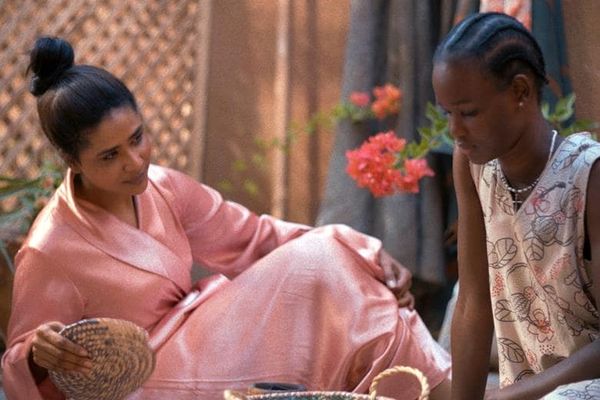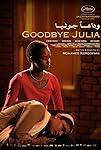Eye For Film >> Movies >> Goodbye Julia (2023) Film Review
Goodbye Julia
Reviewed by: Jennie Kermode

Sitting in his car after kicking a football about with the boy, Akram (Nazar Goma) takes out a cloth and carefully wipes his hands. It’s small moment in a film full of similarly delicate observations about the way that racism can manifest amongst people who don’t necessarily think of themselves that way.
Set between the end of the Second Sudanese Civil War and the referendum on secession for South Sudan, Mohamed Kordofani’s film explores the tensions between the country’s different ethnic groups through the microcosm of a single household. Akram, a factory owner, recalls southerners working as slaves in his grandfather’s house, and continues to refer to them that way, much to the horror of his wife Mona (Eiman Yousif). He’s old fashioned in his treatment of her, too. At first it shows in the details of their daily habits, the way she apologises if she isn’t serving him exactly what he wants to eat that day. Later we will learn that he has forced her to give up her vocation. He has a habit of asking her where she’s been, of checking her phone. It’s a tense, uncomfortable household. She still refers to him as ‘a good man’, presumably because he takes care of their finances and doesn’t actually hit her.
Relations seem much more relaxed between Julia (Siran Riak) and her husband Santino (Paulino Victor Bol), but their life is not easy. When violence comes to their neighbourhood, they forced to flee, going to live with Julia’s sister in a shanty town. it’s there that the accident happens. Mona is driving back from a fertility clinic where she has received bad news. Distracted whilst turning the car, she hits their son, Daniel. Due to her fear of Southerners like them, she speeds off, with Santino in hot pursuit, and calls Akram to tell him that a Southerner is chasing her. Without context, he tells her to return home as quickly as possible, and when Santino arrives he shoots him dead.
The remaining part of the film deals with the consequences of this incident, and of the Arab couple’s response. Strings are pulled. Santino effectively disappears. Mona is wracked by guilt, but doesn’t want Akram to be charged with murder, so she secretly tracks down Julia, who has no idea what has happened to her husband, and takes her on as a servant, housing her and Daniel in a shed adjacent to her home. It’s a precarious situation. Little things threaten to give her away. In their different ways, Akram and Daniel are both suspicious. Only Julia seems to rise above it, traumatised by the loss of Santino but making plans and gradually moving on with her life. Unhappy as she is in her domestic situation, Mona becomes increasingly emotionally dependent on her, whilst her inability to have a child binds her to Daniel despite his distrust of her.
Despite the tight focus on this household, Kordofani finds numerous ways in which to show us something of the wider environment in which it’s taking place. A church offers welcome regardless of colour or creed, and takes a celebratory approach to the potential offered by peace. Street campaigners talk about the coming referendum, urging Southerners to vote for a separate state where they can build a life on their own terms, without prejudice affecting everything they do. Akram observes that if that comes to be, they’ll find themselves deported, and he punctures Mona’s bubble of righteousness, pointing out that she too is benefiting from a socio-economic situation which lets her employ Julia for pennies. Meanwhile, in a local café, live music provides a means for people to connect and break down social barriers, and women get a taste of equality.
Much of it, of course, depends on the performances, and the superb cast don’t let it down. Riak, in particular, stands out for her ability to bring depth and complexity to what is ostensibly the most straightforward role. Her strategic silences speak volumes. There’s also good work from Stephanos James Peter as the older Daniel, confounded by the hypocrisies of the adult world.
Whilst the film occasionally feels stagey, especially towards the end, Kordofani uses the greater intimacy offered by the camera to bring us close to the characters and reveal the complex layers of relationship developing between them. Akram’s developing attachment to the boy, and the unease it creates within him. The warmth that develops between Mona and Julia, in spite of everything, and its fragility, weighed against suffering and the need to survive. The various forms of pity which prove every bit as poisonous as lies. Julia’s quiet contempt for Mona’s failure to assert herself, and her own determination not to let a man decide her course. Is there are any room here for forgiveness? Should there be? And if not, how sustainable is a world built, instead, on tolerance?
An intelligent piece of work which finds a surprising amount of nuance in highly emotive situations, Goodbye Julia is a valuable early contribution to Sudanese cinema’s efforts to process the country’s conflicts. It sets a high bar for others, and its quality should also help to facilitate improved understanding of the conflicts around the world, giving those affected a much needed voice.
Reviewed on: 02 Jun 2024















